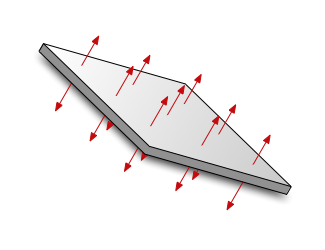Rectangular Plate - Fixed
A rectangular plate fixed at its edges.

(make-object 'rect-plate ... )
A 'rect-plate can be created using the following Lisp syntax (the default values are shown for each of the physical parameters):
(make-object 'rect-plate
(modes 80)
(length0 .5)
(length1 .5)
(thickness .01)
(density 7800)
(poisson 0.3)
(young 2e11)
(freq-loss 10)
(const-loss 10))
The arguments for the physical parameters can be either numerical values or Modalys controllers (either dynamic or constant). If a given parameter is not supplied when using the Lisp syntax, the default parameter value will be used.
- modes: number of modes.
- length0: length along the x-axis in meters.
- length1: length along the y-axis in meters.
- thickness: in meters.
- density: in kg/m^3. See chart of material properties for appropriate values.
- young: Young's modulus, in N/m^2. See chart of material properties for appropriate values.
- poisson: Poisson Coeffieient. Usually has a value of 0.3. See general object information.
- freq-loss, const-loss: loss coefficients. See General object information.
Note that, unlike other objects, the values for freq-loss and const-loss default to 10 for this object.
A rectangular plate can be accessed in its z-direction ('normal) from any point on its surface.
(make-access my-plate my-2D-controller 'normal)
This makes an up-and-down access (in the z direction) at a point on the surface of my-plate. The point is defined by my-2D-controller where the first dimension is x and the second is y (the plate's corners being the points (0, 0), (0, 1), (1, 0) and (1, 1)). For example, in order to access the center of the plate we can say:
(make-access my-plate (const 0.5 0.5) 'normal)
Options
A rect-plate can be tuned to a specific pitch, using the (set-pitch ...) function, by adjusting one of the following physical parameters:
- 'size
- 'thickness
- 'density
- 'young
Note that for 'size, both the x and y dimensions are scaled together proportionally in order to preserve the harmonic relationships the plate's mode frequencies.
(setq my-plate (make-object 'rect-plate))
(set-pitch my-plate 'size (const 440))
- Modalys
- Summary
- An Introduction to Modalys
- Getting Started
- Objects
- Object Properties
- Object Reference
- One-Mass - Mono-directional (Harmonic Oscillator)
- Two-Mass - Mono-directional
- Two-Mass - Bi-directional
- String (or Rod) - Mono-directional
- String (or Rod) - Bi-directional
- Tube - open/open
- Tube - closed/open
- Tube - closed/closed
- Rectangular Membrane - Fixed
- Circular Membrane - Fixed
- Rectangular Plate - Fixed
- Circular Plate - Clamped
- Circular Plate - Free
- Rectangular Free Bar
- Violin Bridge
- Cello Bridge
- Jet Object
- Single Point Object
- Radiator Object
- Clone Object
- Save Modal Object
- Read Modal Object
- Resonance Model Object
- Piano Soundboard
- Finite Element
- Object Utilities
- Hybrid Objects
- Accesses
- Connections
- Controllers
- The Modalys Workspace
- Finite Elements
- Appendix
- Index
